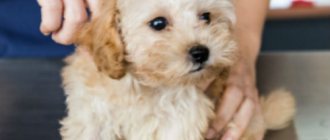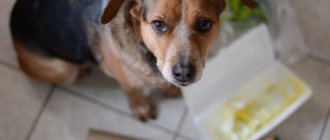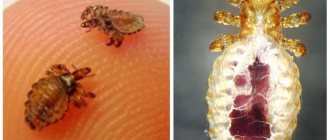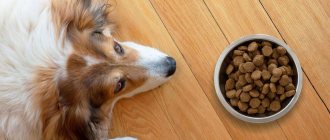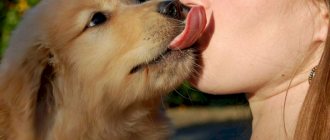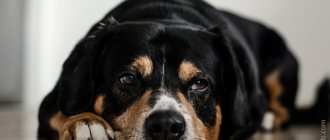Among the main tasks of a dog owner, a special place is occupied by paying attention to the health of the pet. When the first signs of ill health appear, you must immediately seek help from a veterinarian in order to prevent the development of dangerous, sometimes life-threatening, complications.
One of the most frequently diagnosed problems in veterinary practice is diarrhea with mucus. Pathology can appear both in early and adulthood. The main reasons for the development of diarrhea with mucus are helminthiases, protozoan infections, inflammatory processes in the intestines, as well as a number of other pathologies in the body.
Age-appropriate causes of diarrhea
Frequent loose stools for a day or more indicate serious problems in the baby’s body - it could be poisoning or a virus.
Acute diarrhea that lasts more than 2 days is a serious reason for a full examination to identify diseases.
Newborns are having fun
The breeder must carefully monitor the condition of the newly whelped bitch and her offspring. It happens that newborn puppies develop eating disorders - usually the reasons are as follows:
- the kitten does not accept mother's milk or reacts poorly to what the mother has eaten;
- an allergic reaction to artificial nutrition is detected;
- E. coli, streptococcus or staphylococcus;
- a virus transmitted from the mother.
Elimination of any of the causes requires the intervention of a veterinarian. It is prohibited to independently treat a bitch and her offspring - even the simplest disease can kill babies in a few hours if treated incorrectly. Therefore, if there is the slightest problem, the breeder should contact the clinic.
A puppy at 1 month
Diarrhea in a 1 month old puppy can be caused by:
- poor nutrition (early introduction of complementary foods);
- teething;
- the presence of infection in the body;
- parasitic infestations (fleas or helminths).
First of all, complementary feeding is changed to specialized wet food. If the stool disorder does not stop, we are talking about more serious cases. Infections with parasites or viruses must be treated by a doctor.
In a puppy at 2 months
It happens that completely independent puppies experience indigestion, including loose stools. Diarrhea in a puppy at 2 months is caused by the following:
- excessive gluttony - most children do not have a feeling of satiety, the problem is especially acute in small breed dogs;
- poor nutrition – bad food or stale natural food;
- the presence of worms in the body;
- infectious disease.
Therapy for puppies of this age is carried out with medications under the supervision of a veterinarian. Self-treatment is dangerous - it risks overdose, intoxication, or simply ineffectiveness.
If the kitten is simply overeating, reduce the amount of food eaten at a time.
Puppy 3 months or older
During this period of life, the pet becomes completely independent. He studies everything around him that could affect his health: injuries, poisoning or infections are not uncommon. In addition, at the age of 3-4 months, dogs' teeth change, which can also cause loose stools. Diarrhea in a 3-4 month old puppy can also appear after vaccination.
Treatment for your pet depends entirely on the diagnosis. To alleviate the animal’s condition, you can give sorbents, for example, Smecta or Polysorb, but only after you have consulted with a veterinarian about the dosage.
Prevention
As a preventative measure, the following must be observed:
- Feed your little one only fresh, high-quality foods. Look at what foods you can give your dog and what you can't.
- Nutrition should be balanced. Food consumed by humans is very harmful to animals. You can read about how to feed your dog properly.
- Do not under any circumstances overfeed the animal.
- Do not allow your pet to pick up food on the street. She may be poisoned.
- To avoid infectious diseases, annual vaccination is required.
- Regularly, 2-3 times a year, deworm your pet.
Types of diarrhea according to symptoms
The cause of unstable stool can be guessed by tracing the accompanying symptoms and noting some features of the excrement.
Asymptomatic diarrhea
During the first few days, newborn puppies undergo a process of adaptation to their new life, which can cause loose stools. There is nothing to worry about if the puppies are a little wet, but are gaining weight well and appear calm.
“
Asymptomatic diarrhea in a puppy also occurs as a reaction to vaccination or the action of an anthelmintic. The veterinarian must warn you about this side effect and advise you what to do in this case.
In addition, one-time diarrhea occurs due to the consumption of a new type of food or spoiled food, from too heavy or fatty meat. You can restore stool with a non-strict diet for several days. But if diarrhea continues for more than a day, it is necessary to show the baby to the veterinarian as soon as possible - perhaps this is a mild poisoning that needs to be treated.
Be careful - very small puppies do not know how to control their appetite, so when introducing complementary foods, be careful not to give too much. From overeating, the stool can become fixed or, on the contrary, relax.
With vomiting
One-time diarrhea with vomiting can be caused by poor-quality or unusual food, as well as a large amount of food eaten. Most often, vomiting and diarrhea indicate food poisoning, but there are other causes:
- the puppy has eaten too much;
- the owner gave the animal very fatty food;
- the puppy was poisoned by medications or chemicals (sometimes animals eat bait for rats or other pests);
- eaten small or chewed part;
- proliferation of parasites in the dog’s body (in this case, after eating, the dog may experience hiccups, vomiting, and sudden weight loss).
There are other, more serious, causes of diarrhea in an animal. Only an experienced specialist can diagnose them, but based on the symptoms, the owner himself can make a preliminary diagnosis for the pet. This:
- Coronavirus and rotavirus infections
. During illness, puppies can have a strong temperature fluctuation from low to high, the mortality rate is up to 80%.
- Parvovirus enteritis in a puppy
. This is a more serious disease for your little tailed friend. Often the disease ends in the death of the pet - without treatment, the puppy dies completely. The younger the dog, the less time is left to save him.
- Infectious hepatitis
. The puppy can suffer from the disease for up to 2 weeks, the virus differs from the rest in the slow enlargement of the liver and the formation of keratitis, the temperature fluctuates from high to low and vice versa.
To avoid infection with viruses, it is necessary to get vaccinated on time and maintain quarantine after them.
Unusually colored stool
If your puppy has diarrhea, pay attention to its color. By color you can understand what exactly has gone wrong in the body of a small pet.
Red diarrhea
, usually caused by the presence of fresh blood in the feces - this is a sign of injury to the intestines, anus, or severe inflammatory and viral diseases. Such conditions require emergency treatment from a veterinarian.
Black chair
also indicates that the puppy has diarrhea with blood - only the coagulated one. If it has time to coagulate, it means that the bleeding occurred in the upper intestines or in the stomach.
Yellow or green stool
causes the most discomfort in the puppy, and also indicates various diseases. Stool coloring green occurs against the background of the development of putrefactive microflora. The dog may develop a fever and feel unwell.
Brightly colored yellow diarrhea
speaks of liver problems. The most common disease in dogs is jaundice, which can be treated at a veterinary clinic.
Whitish soft stool
indicates a disease of the pancreas - pancreatitis - or liver failure.
With blood
If your puppy has bloody diarrhea, you must immediately go to the veterinary clinic, since self-medication is prohibited during such an exacerbation. Blood in the stool indicates a possible mechanical injury to the stomach/intestines or inflammation of the internal organs. The doctor may make the following diagnosis:
- injury to the intestines or stomach due to an ingested item;
- diseases of the gastrointestinal tract of an infectious nature;
- diseases of internal organs due to parasites, for example, hemorrhagic leptospirosis;
- poisoning with medications or chemicals;
- formation of ulcers and erosive wounds.
The first thing doctors do is stop the bleeding. If a serious problem is discovered, then it is necessary to take a course with strong and strengthening drugs. Sometimes lesions of the gastrointestinal tract (tumor, ulcer) require surgical intervention.
With mucus
Mucus in a pet's stool occurs along with vomiting and/or blood; in many cases, it appears simply due to diarrhea.
Possible reasons:
- the dog’s body reacts to antiparasitic drugs;
- an inflammatory process has begun in the large intestine, which is a sign of a hidden illness;
- intestinal microflora is disrupted;
- infections such as enteritis or plague are present.
It is necessary to get tested at a veterinary clinic. After this, the doctor will prescribe treatment. In advanced cases, the puppy spends several days in the hospital.
With a pungent odor
Of course, excrement should not have a pleasant smell, but most often it can be distinguished from an unhealthy-smelling one. The latter is a symptom of diseases that require referral to a specialist. The reasons may be the same:
- parasitic infections;
- viral enteritis;
- newly aggravated diseases of the gastrointestinal tract and liver;
- salmonellosis.
If salmonella is confirmed (to identify it, it is necessary to examine the pet and submit a bacterial culture), serious treatment is carried out with a diet, and the food must be rich in vitamins. To begin with, the doctor will prescribe drugs with hyperimmune antitoxic serum and immunoglobulin, and then antibiotics.
After vaccination
It is not uncommon for a dog of any age to experience diarrhea after vaccination. There is no need to worry in such cases if everything is under the control of a veterinarian. But there may also be complications if the reasons are:
- the presence of ARVI or gastrointestinal disorders during the vaccination period;
- deworming not carried out (a week before vaccination, the animal is given a parasite tablet for prevention);
- administration of a spoiled drug;
- diseases in which diarrhea is aggravated by other symptoms.
If the doctor believes that loose stools are an acceptable reaction of the body, then you just need to eliminate the short-term symptom. If the puppy feels unwell for a long time (either low or high temperature, refusal of food and water, malaise), it is necessary to examine the animal for diagnosis and further treatment.
Bloody or mucous matter
Diarrhea with blood in Yorkies is most often observed with parvovirus enteritis. In this case, there is an admixture of scarlet color in the stool. Reddish discharge is also observed with abdominal injuries. This is a sign of intestinal damage. Such trauma is observed not only when an animal falls, but also when a sharp meat or fish bone is swallowed.
Bloody diarrhea may be a symptom of hemorrhagic leptospirosis. This is a severe bacterial disease that affects the intestines and kidneys. In this case, the dog’s temperature rises sharply, and blood can be seen not only in the stool, but also in the vomit.
With such severe pathologies, the pet needs urgent qualified help. If your dog’s health is rapidly deteriorating, you should call a veterinarian at home.
Diarrhea with mucus in a Yorkie most often indicates a helminthic infestation. It may also be a symptom of pancreatitis or colitis.
Why is diarrhea so dangerous for babies?
The danger of diarrhea for puppies is that, along with liquid feces, nutrients that are so necessary for growth and maturation are washed out of the body. If a puppy has loose stools, this can lead to intoxication and dehydration (dehydration), which, in turn, provokes various disorders.
In addition, the water-electrolyte balance, metabolic processes, acid-base reactions are immediately disturbed, and dehydration quickly occurs. With normal functioning of the intestines, approximately 55-70% of the incoming fluid is absorbed into the body, and with diarrhea it is almost completely excreted in the feces. Wherein:
- puppies lose weight quickly;
- look exhausted, lethargic;
- general body temperature decreases;
- the condition of their fur deteriorates;
- the skin thickens;
- mucous membranes become dry;
- the body's immune strength decreases.
Prolonged dehydration is fraught with coma, death and is very dangerous for the health of a small pet, especially for miniature breed dogs. Even with one-time diarrhea, it is important to feed your pet to maintain fluid in its body.
What are the dangers of loose stool mixed with blood?
Any disorder in a dog’s body should alert its owner, especially if it is accompanied by the appearance of blood and a general depressed state of the pet. Bloody diarrhea is often a sign of a malignant tumor or a foreign body stuck in the intestine, which means that the sooner the operation is performed, the greater the dog’s chances of continuing to live. Viral and infectious diseases can also be fatal, so do not underestimate them either.
A deterioration in well-being and a change in normal behavior against the background of the possible death of a pet does not seem so dangerous, but do not forget that the animal should live a full life and not suffer from pain.
Help at home
If your pet has developed intestinal problems relatively recently, you can try to help the puppy yourself. What you need to do from the very beginning:
- fill the animal’s bowl with clean filtered, not cold water (do not replace the water with another drink - milk or soup broth);
- during illness, remove excrement immediately, wash the tray and bedding thoroughly - this will protect against the spread of infection, if any;
- do not give food to the puppy for 24 hours;
- Do not force the animal to drink in the first hours.
Rapidly developing diarrhea throughout the day may be the first sign of a bacterial or viral infection. Under such circumstances, it is not advisable to delay a visit to the veterinarian. The best option would be to invite a doctor to your home so as not to tire your already sick pet and not create unnecessary discomfort for him.
Unfortunately, sometimes it is impossible to cure an animal at home, but you can always alleviate the animal’s condition before a specialist arrives. The most important thing is to avoid dehydration and be extremely attentive to other symptoms that may appear within a few days.
Binge eating
Many dogs are gluttons . You shouldn’t blame them for this, since in nature wolves, who are the ancestors of modern dogs, don’t get to eat every day. Considering that domestic dogs receive food in the proper quantity, they can overeat almost every day, “sweeping away” their food allowance in a few seconds.
As a result, food in the form of large pieces ends up in the stomach and intestines, making it difficult for the digestive system to process it. It “stagnates”, and putrefactive processes develop in the thickness of the food masses. The body responds accordingly to the appearance of a “hotbed” of toxins, and diarrhea begins.
Mucus impurities are just a protective reaction of the body plus an inflammatory process of the catarrhal type . If the cause of the development of pathology is indeed gluttony, it is necessary to put the pet on a daily starvation diet. During this time, the animal’s intestines will be cleared of unnecessary and toxic substances, and mucous diarrhea will subside on its own.
We immediately warn you: if the animal’s condition does not improve in any way within 24 hours, but signs of a deterioration in the process are clearly visible, immediately contact a veterinarian! Further waiting will not lead to anything good.
Diagnosis and veterinary prescriptions
Of course, first aid carried out at home is good (revising the nutrition system and diet), but prolonged diarrhea in a puppy is a good reason to visit the veterinarian. Infections and inflammation of internal organs, unfortunately, can be fatal for the baby.
When to take your puppy to the doctor
If your puppy's diarrhea lasts 2-3 days, doing something on your own is useless and dangerous - you need to consult a doctor. Frequent loose bowel movements, the appearance of mucus, blood in the stool, vomiting, general lethargy and other associated symptoms are a reason to show the puppy to a doctor. You should not linger, since it is impossible to prevent dehydration and intoxication at home.
If there is no vomiting, the puppy responds adequately to stimuli, is cheerful, does not refuse food, the temperature is normal and, most likely, the cause of the dog’s loose stool is overfeeding, poisoning with stale food, treatment can be carried out at home.
Medicines and restorative drugs
Prolonged diarrhea is accompanied by loss of electrolytes, so the first aid will be to replace them with a water-salt solution intravenously, and only a person with a veterinary education can do this. What will the doctor do:
- If the cause is a stuck foreign object that definitely will not come out with the feces, then the doctor will remove it - this is done through surgery.
- If there is a suspicion of parasites, the doctor conducts the necessary tests to determine their type and prescribe the necessary treatment. The pet will need to be given medications, and after treatment is completed, tests will be taken again to make sure that the animal is healthy.
- Infectious diseases are treated comprehensively - the pathogen is destroyed, and the body is strengthened with immunomodulators, vitamins, hepatoprotectors and other drugs, depending on the symptoms.
- In case of poisoning, serum is injected, then toxins are removed, the stool is fixed and the lack of nutrients is replenished.
Of course, only a doctor prescribes treatment. He will also recommend a diet and tell you about the features of caring for a sick pet. The use of folk remedies is possible only if the attending physician has approved them and calculated the dosage - otherwise, irreparable harm to the health of a weakened baby can be caused.
If problems with stool can be eliminated at home, the doctor tells you what to give your puppy for diarrhea and in what proportions. It is prohibited to administer any medications on your own.
What to feed a dog with diarrhea?
If a dog develops diarrhea, many novice dog breeders do not know what to do. Any beginning diarrhea in a dog, treatment begins with a diet. For half a day or a day, your pet should be given exclusively fresh water, without offering food. Next, the animals are offered boiled chicken, thermally treated chopped beef, and boiled rice. The four-legged friends are transferred to a regular diet after a few days. It is advisable to prescribe medications in the form of antibiotics, anthelmintics and other strong drugs after tests.
Therapeutic diet and drinking regime
If your pet has diarrhea, the first step is to put him on a 12-24 hour fasting diet. Representatives of dwarf breeds, as well as newborn puppies, should not be fed for more than 6-10 hours. In this case, the pet must have constant access to fresh drinking filtered water.
If the animal refuses to drink on its own, pour water into the mouth in small portions through a regular syringe without a needle. Water can be replaced with tea or herbal infusions with the approval of a veterinarian - you will receive an initial consultation by phone. It may be easier for your dog to lick an ice cube - this is a good solution if he is vomiting.
“ Please note that giving a puppy solid food when it has diarrhea is strictly prohibited. Especially if there is mucus in the excrement. Eating food can trigger vomiting and will only make the situation worse.
Fasting relieves inflammation in the intestines and gastrointestinal tract, and also stops minor internal bleeding. To normalize the electrolyte balance and replenish fluid loss in the body, give the puppy Regidron solution.
In severe advanced cases, infusion therapy is carried out in a veterinary clinic. Physiological solutions (isotonic glucose, Ringer-Locke solution) are administered intravenously to puppies.
Every dog owner should know what to feed his puppy when he has diarrhea - this will come in handy at least once in his life. Symptoms of diarrhea are quickly relieved by steep rice decoction, decoction of oak bark, chamomile, St. John's wort, sage, and yarrow. These simple and affordable remedies have an astringent and anti-inflammatory effect. Before use, consult a veterinarian.
“ At the first signs of improvement, you can give the puppy boiled chicken or turkey meat, veal, or lean broth. An alternative is dietary wet food.
Gradually introduce fermented milk products into your diet - low-fat cottage cheese, natural yogurt, kefir. Fermented milk nutrition has a beneficial effect on the gastrointestinal tract and normalizes the intestinal flora. For porridges, it is best to give buckwheat, rice, oatmeal, cooked in water or meat broth. Introduce new foods into your diet gradually, in small portions.
Food must be crushed for at least the first 3-4 days to make it easier for the intestines to digest it. The daily portion is divided into many small parts and served warm to the puppy more often than usual. If the dog refuses to eat, there is no need to force him - but you will definitely have to give him water.
Dry food is excluded from the diet for a while, replacing it with natural food or wet diet food. All dishes must be fresh and of high quality.
Stool color
It is important to pay attention to the color of the feces. Unusual coloring of stool may be a sign of serious pathologies:
- Black feces This color of stool is a formidable sign. Tarry stool is a symptom of bleeding from the stomach or upper intestines due to ulcerative pathologies.
- The stool is white. Discolored stool is released when the bile ducts are blocked. This is accompanied by serious dysfunction of the gastrointestinal tract. Pieces of undigested food can be found in feces.
- Green feces The stool acquires this color in cases of severe poisoning with rotten food. This is a rather dangerous sign that indicates severe intoxication. Typically, the discharge of green feces is always accompanied by severe repeated vomiting.
Liver diseases
With liver disease, stool becomes not mucous, but “greasy.” Moreover, in the literal sense of the word. Since the liver either stops producing bile, or its entry into the intestinal lumen is for some reason difficult, the breakdown and absorption of lipids stops. This causes the feces to become slimy and very sticky. If your dog is a “pocket” breed, this is very easy to notice when you wash his litter box every day.
Contrary to popular belief, with “liver” pathologies, yellow stool does not happen!

